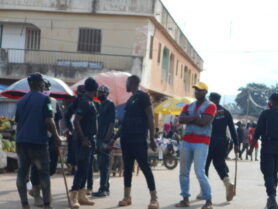Blog
Profile – Murtala Ibrahim
Trained in Religious Studies (University of Jos, Nigeria), I received my Ph.D. at the Department of Philosophy and Religious Studies, Utrecht University in 2017. After concluding a one-year research fellowship at the Institute of Cultural Anthropology, Freie University Berlin, I was accepted as a postdoctoral researcher under the SACRASEC project at the Department of Cultural Anthropology, Utrecht University.

Image courtesy of Murtala Ibrahim
The site of my field research is Lagos, which is one of the megacities of the global south. Lagos is the most populous city in Nigeria and the second-largest city in Africa. The metropolitan area has a total population of 21.3 million, making it the second-largest metropolitan area in Africa after Cairo. Lagos is a major financial center for all of Africa and is the economic hub of Nigeria at large. Lagos was the capital of Nigeria since its amalgamation by the British in 1914, however, the federal capital moved to Abuja in 1991. A large percentage of Lagos’s economy is in the informal sector, even though the city is the commercial and industrial hub of the country. The myriad problems of the informal economy are exacerbated by deteriorating infrastructure, environmental degradation, and unemployment problems.
Due to its size and the level of economic and environmental informality, crime is widespread from burglary to armed robbery. The crime situation is complicated by the presence of notorious street gangs known as “Area Boys,” who often engage in crime and urban violence. A serious lack of resources (for example, proper skilled leadership, and training, vehicles, communications equipment,) continues to undermine the effectiveness of the state police. For this reason, non-state security actors play important roles in security provision in the city. These non-state security actors vary from business-oriented private police firms to different kinds of community-initiated vigilante formations.
My research will focus on the Vigilante Group of Nigeria (VGN) which is one of the most important vigilante groups that are flourishing in Lagos. This group was established in 1982 by Alhaji Ali Sokoto in Kaduna State. As a result of rising crime in Kaduna, Ali Sokoto came up with the idea of forming a vigilante group that would cooperate with the police to curb criminal activities. The organization was registered in 1999 with Nigeria’s Corporate Affairs Commission. The VGN has achieved rapid expansion in Lagos and its offices spread throughout the city. These offices are either makeover stalls or makeshift shacks constructed on public lands.
People identify vigilante offices through their logos painted on the walls and their signboards. The offices are hubs where vigilantes gather together for meetings and administrative activities as well as adjudicating civil cases. The VGN imitates and acts like state police with a well-defined constitution, hierarchical ranks, and uniform. One of the important functions of the group is to assist the police in the prevention and detection of crime, apprehension of offenders, and protection of lives and property.
In my research, I will explore sources of the VGN’s authority and the social legitimacy the organization enjoyed from the communities. I will also look at how the group invokes religion to validate their authority and enhanced their legitimacy. Moreover, I will examine material paraphernalia of the VGN such as uniform, whistle, torchlight, ID card and their roles in the production of authority. Contrary to power which commands obedience through the use of force, I see authority as the right to direct and command through intersubjective sharing of understanding of the institutions that define legitimate power. In this research, I will approach authority in vigilantism, not as fixed unchanging power relations. Rather authority could be understood as embedded in a dynamic relationship between vigilantes and their communities that has to be continually reproduced, cultivated, and nurtured through a variety of security related practices and discourses. This is because in changing social circumstances vigilantes’ authority could be waned, undermined or fractured.
Through the lens of the notion of sovereignty, I will explore the VGN autonomous micro governance of their communities. There is a seeming divergent conception of what constitutes insecurity, justice, and punishment between vigilantes on hand, and the state and human rights organizations on the other. I will look at the clash of these ideas and how the three entities—vigilantes, government, and human rights organizations—negotiate their differences in this issue.

